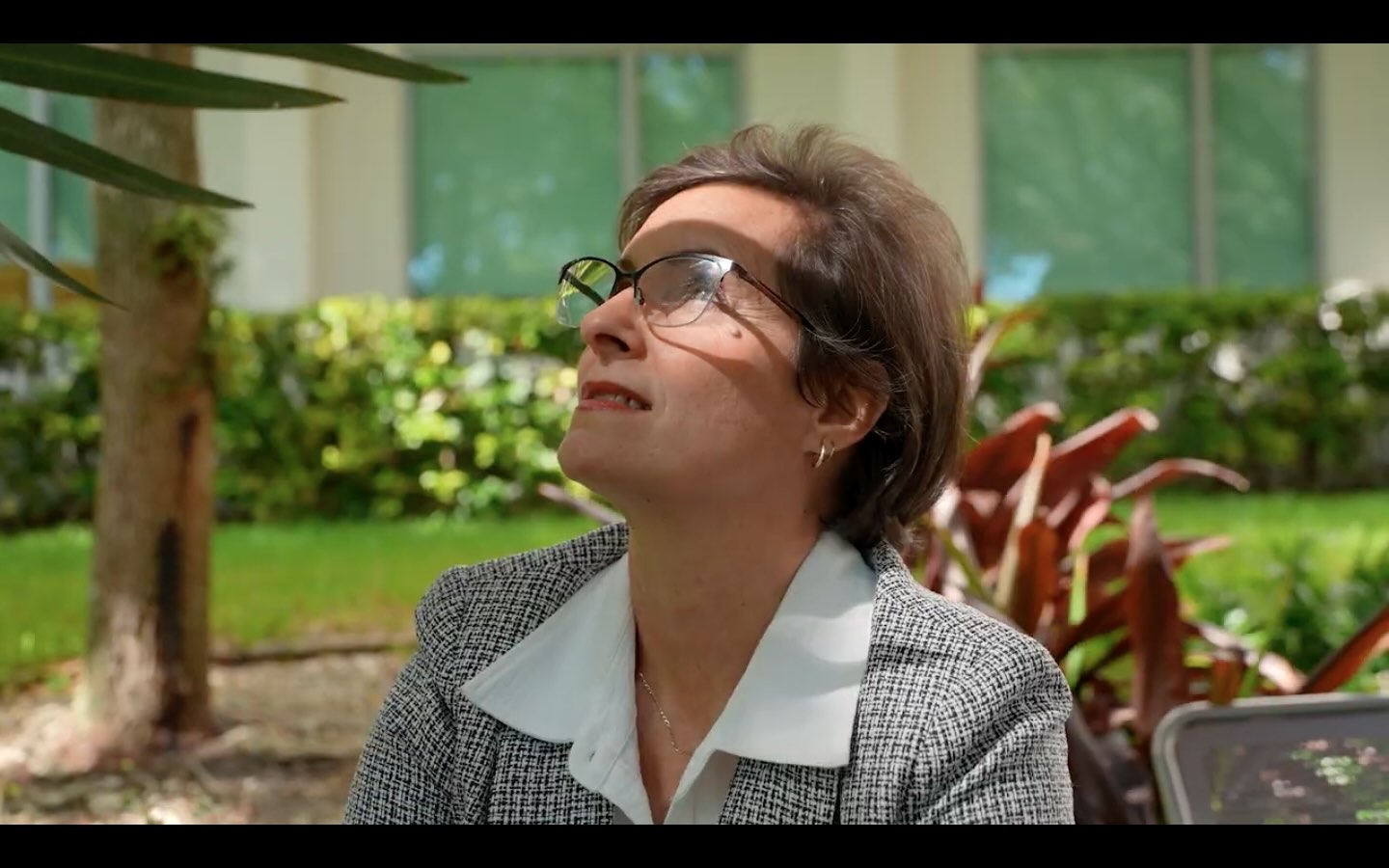Clinical Study Saves Life of Pancreatic Cancer Patient

Faced with the challenge presented by the low survival rates for pancreatic cancer, the scientific community continues to advance clinical and preclinical trials with the aim of developing more drugs and improving patients’ responses to treatments.
[Video is in Spanish.]
The 5-year survival rate for pancreatic cancer is 13%.
“These figures show us that there is much work to be done to better understand this cancer and find more effective treatments that cause fewer side effects,” says Gretel Terrero, M.D., a medical oncologist specializing in gastrointestinal cancers at Sylvester Comprehensive Cancer Center, part of the University of Miami Health System (UHealth).
There are several reasons for the low survival rate. Dr. Terrero says that in more than half of the cases of pancreatic cancer, diagnoses are made when the cancer has already progressed to stage IV and has invaded other organs, making it more difficult to control.
“This is because pancreatic cancer has a characteristic behavior that produces micrometastases relatively quickly in the course of the disease,” says Dr. Terrero. “Micrometastases are individual cells that have spread outside of the original organ and cannot be seen on tomography scans.”
When Dunia Martínez was diagnosed with pancreatic cancer in 2018, it was already at a very advanced stage.
“My situation was quite delicate; I had metastases in several organs,” says Martínez.
Her treatment began at an oncology center in Tampa, where she received 5 cycles of chemotherapy. In the summer of the same year, she decided to move to Miami to be close to her family and seek a second opinion.
Chemotherapy had stopped working, and the disease was progressing. I had lost more than 40 pounds, couldn’t walk, and was in a wheelchair.
Dunia Martínez
In search of a second opinion, she turned to Sylvester, which boasts the only pancreatic cancer center of excellence in South Florida and has access to clinical trials of the Pancreatic Cancer Action Network.
Dr. Gretel Terrero says it’s important to seek a medical team specialized in the patient’s type of cancer, including medical oncologists, radiation oncologists, surgical oncologists, pathologists, and nurses, among others.
“The reason is simple: the world of oncology has evolved so rapidly in recent years that, for a medical oncologist, it’s difficult to keep up with all the treatments and clinical trials available for all types of cancers,” says Dr. Terrero.
Martínez was admitted to Sylvester to participate in the TAPUR clinical trial from the American Society of Clinical Oncology (ASCO) that includes patients with advanced cancer, who have no other standard treatment options, and whose cancer has specific genomic alterations.
“When Mrs. Martínez arrived at Sylvester, we conducted genetic studies and found certain mutations and abnormal proteins. Thanks to that discovery, we were able to enroll her in the TAPUR clinical study,” says Dr. Terrero.
The tumor studies conducted at Sylvester showed a high degree of instability (MSI-H), meaning the cancer had a high number of genomic mutations.
TAPUR was her only option. “There was no other possible medication, and in my case, surgery was not an option because many organs were compromised,” says Martínez.
As part of the trial, Martínez received the immunotherapies, ipilimumab and nivolumab. Fortunately, the tumors disappeared after two years of treatment.
“Immunotherapy started to work from the first moment,” she says. “This gave me a lot of joy and motivation to keep going and realize that recovery was possible,” she adds.
Immunotherapy is a biological therapy that helps the immune system act more effectively against cancer.
Martínez has continued under detailed observation of the Sylvester medical team.
In early 2022, new imaging scans revealed a nodule around the head of the pancreas. The cancer had returned, and it was necessary to restart treatment.
She received the same immunotherapies and had a complete remission, meaning the studies showed no evidence of cancer.
“We have found that certain populations with pancreatic cancer that have specific genetic mutations inherited from biological parents, such as the BRCA gene, respond favorably to immunotherapy,” says Dr. Terrero. “We want to understand why and how to continue improving that effect for all new patients who come to the clinic.”
The function of the BRCA 1 and BRCA 2 genes is to inhibit genetic errors in humans, but when they mutate, they lose this capacity. That’s why people with these mutations are at a higher risk of developing cancer.
“In general, pancreatic cancer does not respond to immunotherapy for several reasons. One of them is that this organ has few immune cells and little immune activity,” says Dr. Terrero.
Sylvester is studying how to change the immune environment of the pancreas through the use of targeted drugs and immunotherapies that help bring and stimulate more immune cells, which will eventually be able to fight cancer.
Currently, Sylvester is involved in several clinical trials for patients with metastatic cancer, including combinations of immunotherapies and drugs targeted at specific proteins that control the growth of cancer cells. “Although this study is preliminary, we have seen clinical results in patients in whom chemotherapies were not working,” says Dr. Terrero.
Dr. Terrero is optimistic about these new studies and other innovative drugs being produced in Sylvester’s preclinical laboratories.
“We hope to have them available for our patients as soon as possible,” she says.
To this day, Martínez remains cancer-free and lives a normal life. She is now 57 years old and works as an English professor at a university in Miami-Dade.
“My body is completely healthy,” says Martínez. “Sylvester gave me a new hope for life.”
Video and article written and produced by Shirley Ravachi.
Tags: Dr. Gretel Terrero, Gastrointestinal Cancer, Immunotherapies, pancreatic cancer
